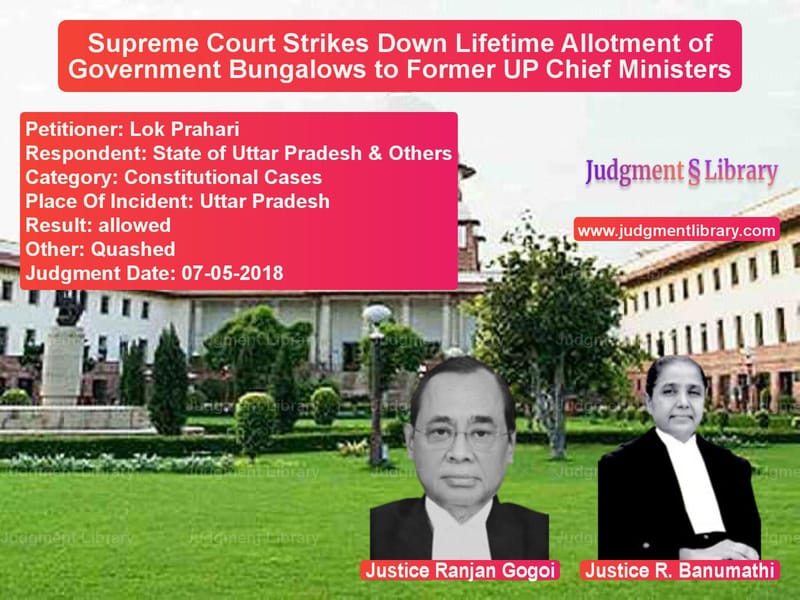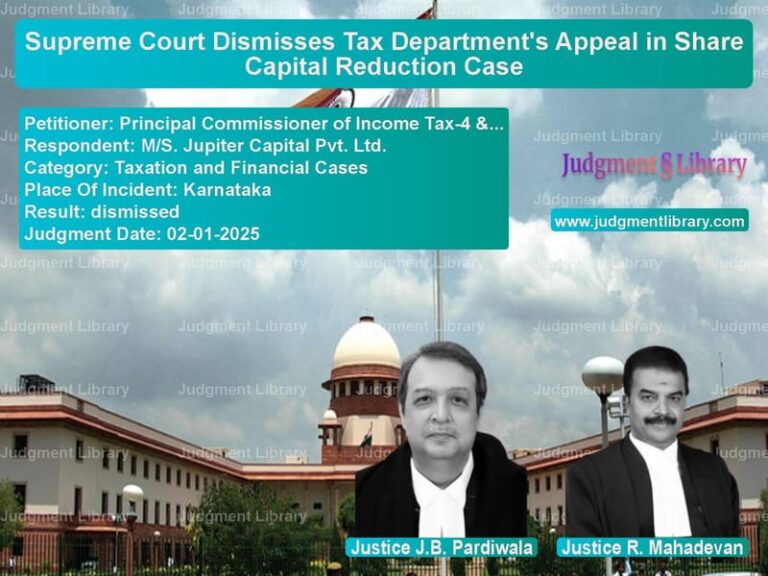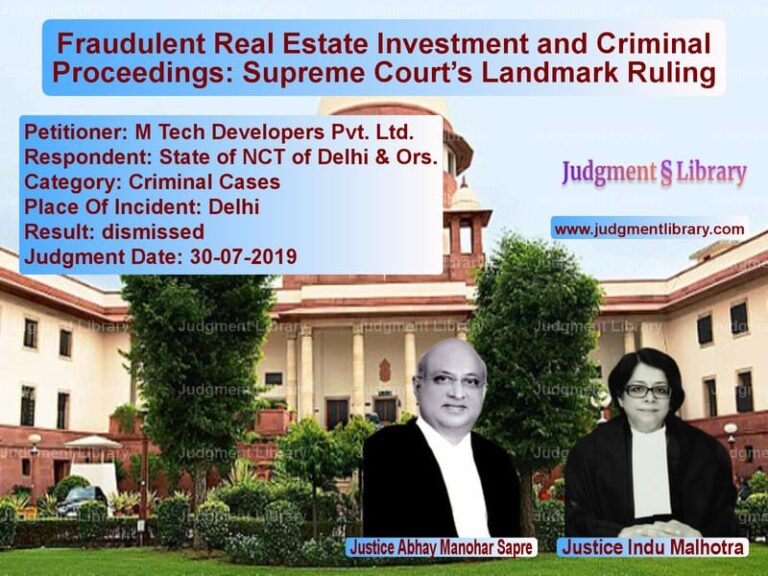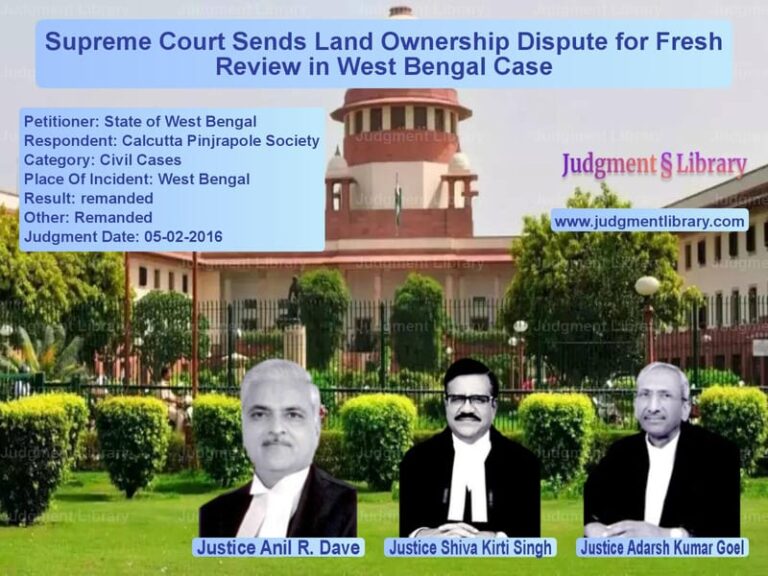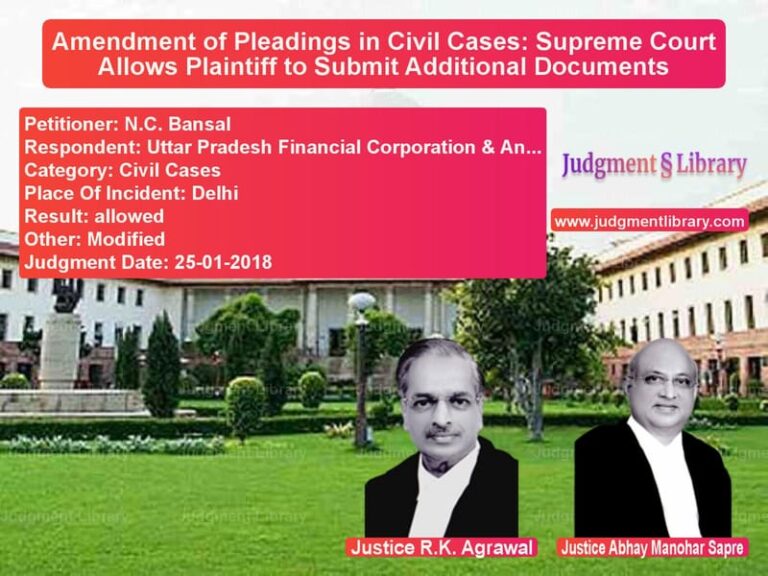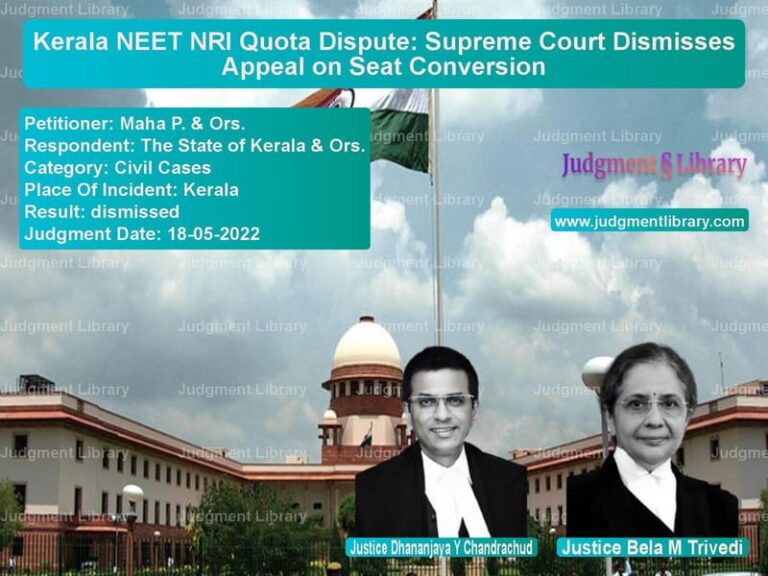Supreme Court Strikes Down Lifetime Allotment of Government Bungalows to Former UP Chief Ministers
The case of Lok Prahari v. State of Uttar Pradesh & Others challenged the constitutional validity of Section 4(3) of the Uttar Pradesh Ministers (Salaries, Allowances and Miscellaneous Provisions) Act, 1981, which granted lifetime allotment of government residences to former Chief Ministers of Uttar Pradesh. The Supreme Court, in its landmark decision, struck down the provision as unconstitutional, ruling that it violated the principle of equality under Article 14 of the Constitution.
Background of the Case
The case had its roots in the long-standing practice of former Chief Ministers continuing to occupy government accommodations even after leaving office. This was challenged by the petitioner, Lok Prahari, a registered society committed to upholding the Constitution and ensuring the enforcement of the rule of law.
The issue first came before the Allahabad High Court, which was seized of a similar petition regarding unauthorized occupation of government accommodations. While the matter was pending, the State of Uttar Pradesh framed the U.P. Ex-Chief Ministers Residence Allotment Rules, 1997 (referred to as the 1997 Rules), allowing former Chief Ministers to retain government accommodations. The petitioner then amended their challenge to contest the validity of the 1997 Rules.
In 2016, the Supreme Court struck down the 1997 Rules in Lok Prahari v. State of Uttar Pradesh, holding that providing official residences to former Chief Ministers violated Article 14 of the Constitution. However, shortly after this ruling, the State of Uttar Pradesh amended the 1981 Act, inserting Section 4(3), which again provided for the lifetime allotment of government accommodations to former Chief Ministers. The petitioner challenged this amendment in the present case.
Key Issues Before the Supreme Court
The Supreme Court was tasked with deciding:
- Whether Section 4(3) of the 1981 Act, as amended in 2016, was ultra vires to the Constitution.
- Whether former Chief Ministers could be granted special privileges by allowing them to retain government accommodations after demitting office.
- Whether such lifetime allotment violated Article 14 (Right to Equality) and constituted an arbitrary exercise of legislative power.
Arguments by the Petitioner
The petitioner, Lok Prahari, argued that:
- Former Chief Ministers held no constitutional position after demitting office and were, therefore, at par with ordinary citizens.
- The 1997 Rules had already been declared unconstitutional, and the 2016 Amendment was an attempt to circumvent the Supreme Court’s earlier ruling.
- Providing lifetime government accommodations to former Chief Ministers created a special class of citizens, violating the principles of equality under Article 14.
- Public property, including government residences, should be used only for serving public offices, and allowing former Chief Ministers to retain them amounted to an unfair distribution of state resources.
Arguments by the Respondents
The State of Uttar Pradesh defended the amendment, contending that:
- Former Chief Ministers required government accommodations due to security concerns and ongoing public responsibilities.
- The provision was backed by an intelligible differentia, as former Chief Ministers performed public functions even after leaving office.
- The State had the authority to enact laws under its legislative powers, and the judiciary should not interfere in policy matters.
Supreme Court’s Observations
The Supreme Court rejected the State’s defense and ruled that Section 4(3) of the 1981 Act was unconstitutional. The key observations were:
1. Special privileges violate the equality clause of Article 14
The Court emphasized that once a person demits public office, they become an ordinary citizen and cannot claim special privileges. The judgment stated:
“Once such persons demit the public office earlier held by them, there is nothing to distinguish them from the common man. The public office held by them becomes a matter of history and, therefore, cannot form the basis of a reasonable classification to categorize previous holders of public office as a special category of persons entitled to the benefit of special privileges.”
2. Public resources must serve public interest
The Court reiterated that public resources, such as government accommodations, should be used for serving public offices and not for personal benefit:
“Natural resources, public lands, and public goods like government bungalows are public property that belongs to the people of the country. The doctrine of equality must guide the State in their distribution and allocation.”
3. The amendment was an attempt to overreach judicial orders
The Court noted that the State government had inserted Section 4(3) after the 1997 Rules were struck down, in an attempt to bypass judicial scrutiny. It held that:
“The insertion of Section 4(3) by the 2016 Amendment is a legislative exercise based on irrelevant and legally unacceptable considerations, unsupported by any constitutional sanctity.”
Final Judgment
After considering all arguments, the Supreme Court struck down Section 4(3) of the 1981 Act as unconstitutional. The key rulings were:
- The provision violated Article 14 of the Constitution.
- Former Chief Ministers must vacate government accommodations within 15 days.
- The State must take steps to recover possession of bungalows occupied by former Chief Ministers.
The Court concluded:
“The retention of government accommodations by former Chief Ministers is not guided by any constitutional principle of equality and fairness. The impugned legislation is arbitrary and discriminatory and is, therefore, struck down.”
Conclusion
This judgment marks a significant ruling on the issue of misuse of public resources by political figures. By striking down lifetime government accommodations for former Chief Ministers, the Supreme Court has reinforced the fundamental constitutional principle that public resources should be used for public purposes. This decision sets a precedent that prevents special privileges from being granted arbitrarily to former holders of public office.
Petitioner Name: Lok Prahari.Respondent Name: State of Uttar Pradesh & Others.Judgment By: Justice Ranjan Gogoi, Justice R. Banumathi.Place Of Incident: Uttar Pradesh.Judgment Date: 07-05-2018.
Don’t miss out on the full details! Download the complete judgment in PDF format below and gain valuable insights instantly!
Download Judgment: Lok Prahari vs State of Uttar Prade Supreme Court of India Judgment Dated 07-05-2018.pdf
Direct Downlaod Judgment: Direct downlaod this Judgment
See all petitions in Fundamental Rights
See all petitions in Legislative Powers
See all petitions in Judgment by Ranjan Gogoi
See all petitions in Judgment by R. Banumathi
See all petitions in allowed
See all petitions in Quashed
See all petitions in supreme court of India judgments May 2018
See all petitions in 2018 judgments
See all posts in Constitutional Cases Category
See all allowed petitions in Constitutional Cases Category
See all Dismissed petitions in Constitutional Cases Category
See all partially allowed petitions in Constitutional Cases Category

